New York Health Act – What’s Stopping Us From Having Universal Healthcare In NY
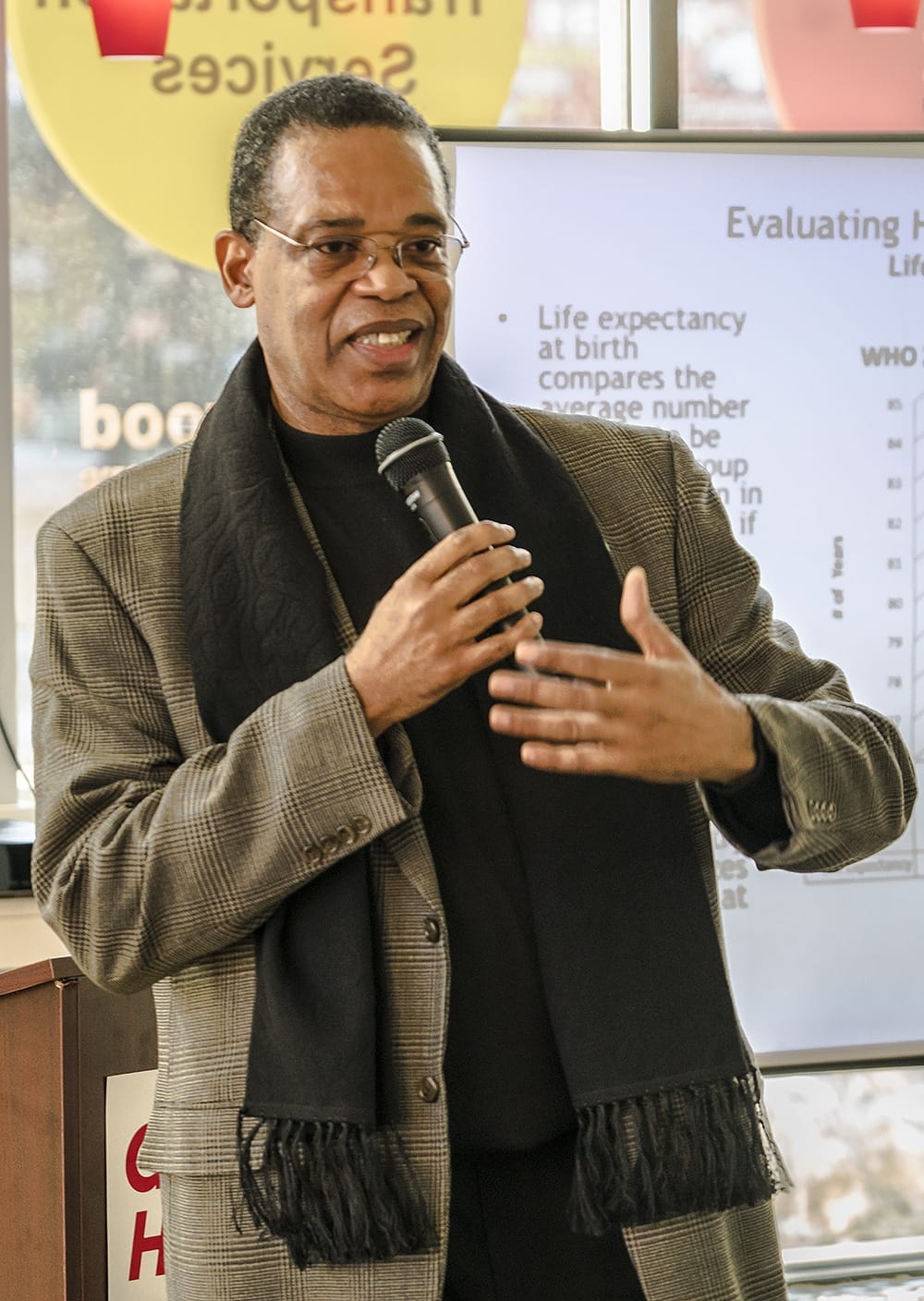
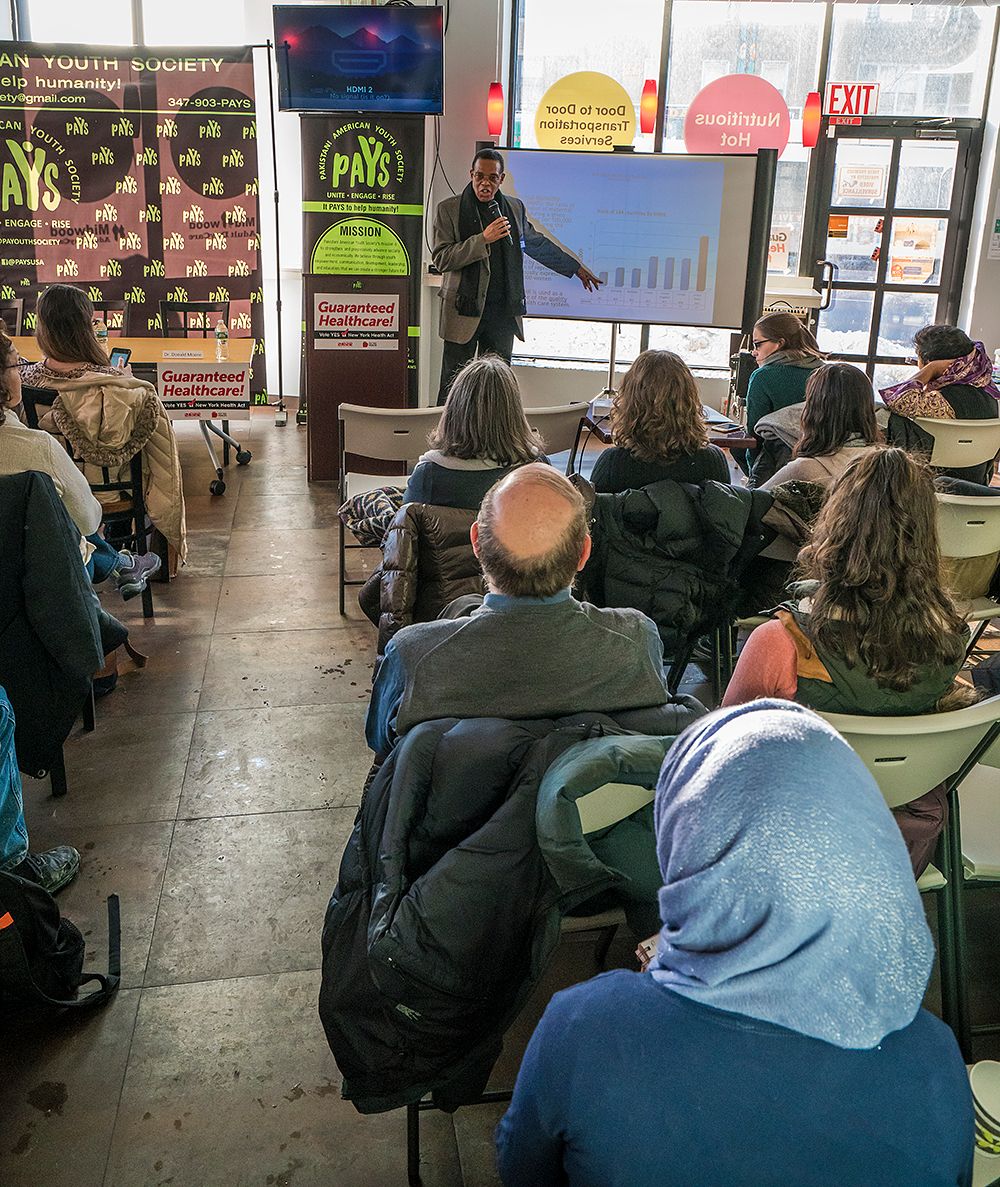
“I can’t look my patients in the eye and tell them “I am able to provide you with the best possible care”,” panelist Devki Joshi who works at the Kings County Hospital shared. “In all honesty, I can’t under this current system.”
Joshi, a 3rd-year medical student with 9 months of clinical experience who hopes to become an OBGYN, was speaking on a panel at a health care forum in Ditmas Park last weekend. She is one of a growing movement of medical professionals and residents alike who believe that the New York Health Act is “the only way forward” and that if New York takes the lead, as it did on issues like same-sex marriage and a $15 minimum wage, other states will follow. “This could really turn the tides of the country.”

About 40 physicians, community organizers, business owners and activists gathered last Sunday at the Pakistani American Youth Society to discuss health care in New York, and in particular – the New York Health Act (NYHA) that has been languishing in the Senate’s Health Committee.
The event was organized by the Campaign for New York Health, a statewide coalition of constituents, nurses, doctors, unions, businesses, nonprofits, legislators, faith leaders and community organizations who believe universal single-payer health care is the way forward for New York State.
Physicians for a National Health Program (PNHP) and local organizations Healthcare Equity Action League NY (HEALNY), Democratic Socialists of America Socialist Feminists, NYS D17 for Progress, Ditmas Civic and Uptown Progressive Action – a NYPAN chapter – partnered with CHNY to bring this educational event to Brooklyn, the latest stop in a statewide outreach campaign.

After a short video explaining the New York Health Act was screened, featured speaker Dr. Donald Moore, M.D., M.P.H., took the floor. Dr. Moore is a long-time Brooklyn community physician, trustee and past president of the Medical Society of the County of Kings, and a board member of the NY Metro Chapter of Physicians for a National Health Program. His presentation, “Healthcare: commodity or basic human right?” explored the current American healthcare system, and why Americans are spending almost twice as much on care but have worse outcomes than citizens of other developed nations.
The single-payer system proposed by the New York Health Act is a solution to what Dr. Moore described as the problems inherent in the current health financing system: excessive costs, inequitable distribution of resources, lack of access and a focus on profits rather than outcomes.
The publicly funded coverage would include no network restrictions, deductibles or co-pays. In other words, it could save New Yorkers money, a good thing considering medical debt is the number one cause of bankruptcy in the United States. Without these financial considerations, the panel concurred, medical decisions could be made based on what people need, rather than on what they can afford.
It would also correct the disparities in how our current healthcare system exacerbates inequality and adversely affects communities of color and immigrant communities in Brooklyn. Joshi, who works at Kings County Hospital, acknowledged that “the people at the brunt end of this failing system are people of color.”
“Racism clearly makes people sick,” Joshi asserted, citing the research and statistics reported by NPR in November. “We can’t undo racism with a single payer system, but we can at least create a level field by expanding access.”
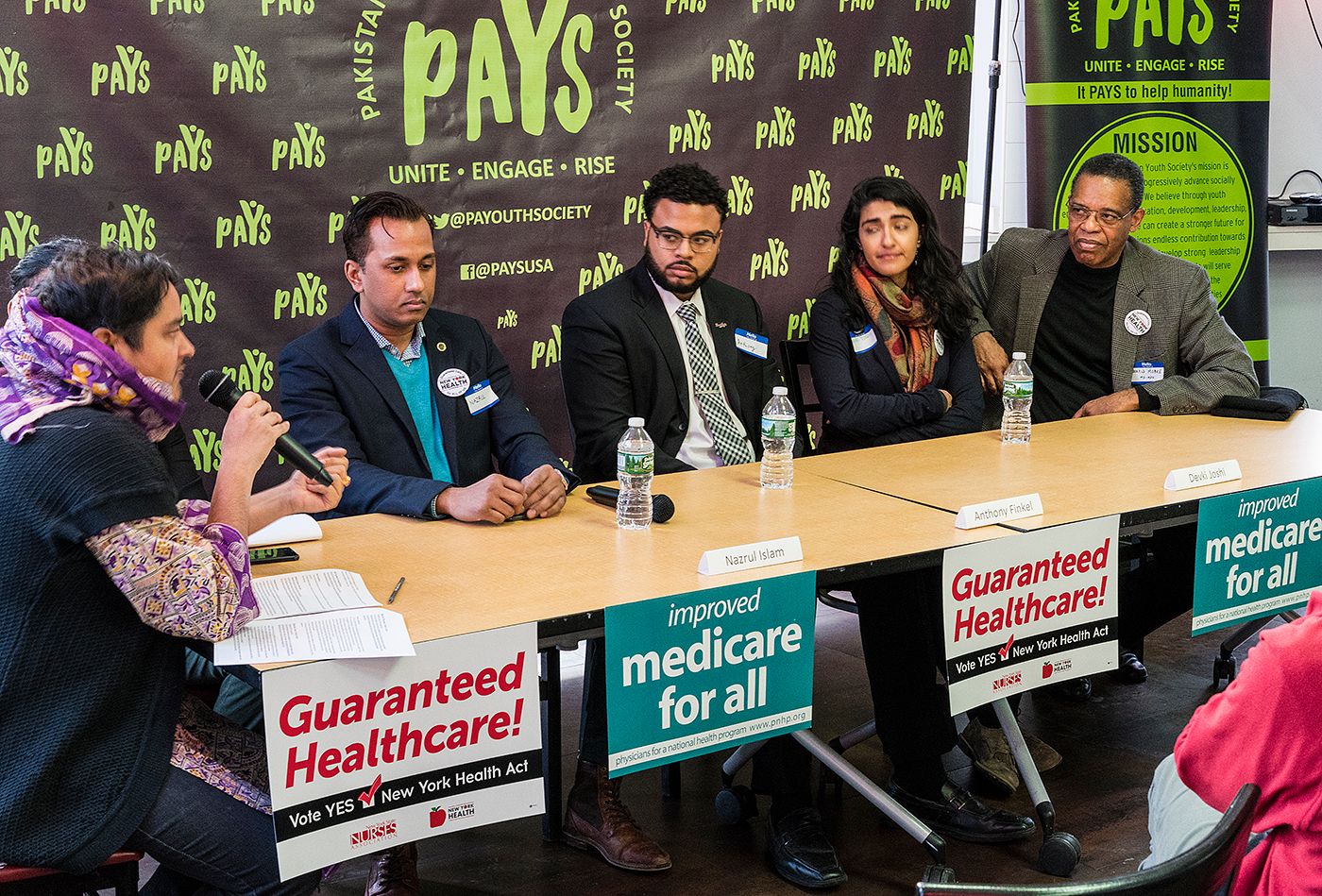
Dr. Moore echoed this sentiment. “The legacy of slavery and Jim Crow…continue to exist,” he said. “Why do half the hospitals in Brooklyn go out of business while the other half gets richer and richer? The bottom line is that if every hospital got the same reimbursement for the same procedure, then it’s on that hospital – it wasn’t efficient. But that’s not where we are today. Do you think a doctor practicing at Kings County is getting the same reimbursement as a doctor working at Methodist for the same procedure? The answer is – no. These providers get different reimbursements. Different reimbursements affect the quality of care provided. A single-payer system would even the score.”
Panelist Anthony J. Finkel, a Brooklyn born and raised entrepreneur, said he could plainly see an imbalance in services available to different communities in Brooklyn, after receiving care at New York-Presbyterian Brooklyn Methodist Hospital in Park Slope and at Kings County Hospital in East Flatbush. “You see it in overcrowded waiting rooms, in the condition of the actual facilities.”
The proposed legislation would also level the field among businesses. Finkel said that a single-payer system would give him, a business owner and employer, “peace of mind” that his employees are in good health and covered in case of injury.
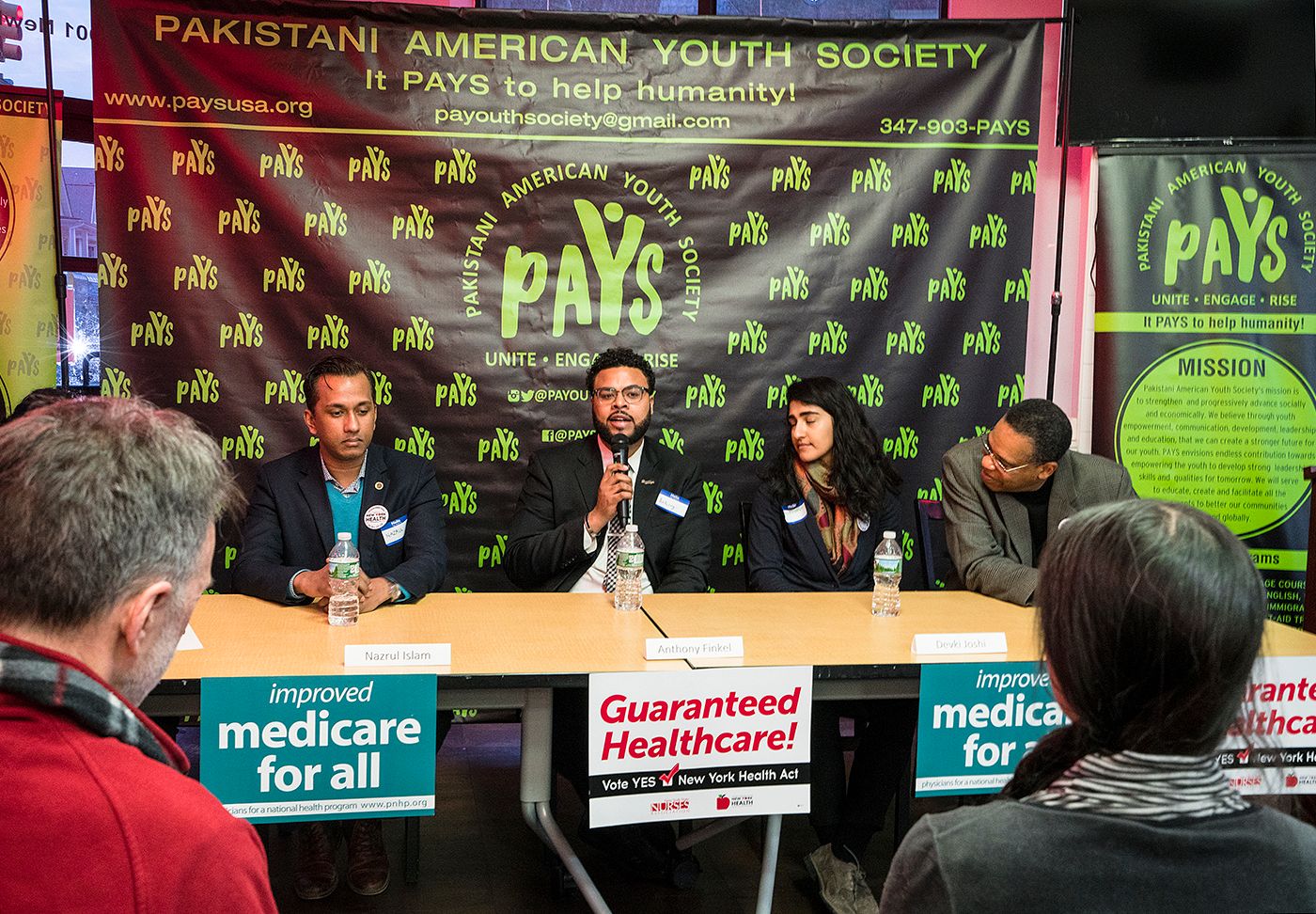
One of CNYH’s initiatives is outreach to business owners. “We want all businesses to be on board,” said organizer Ling Koh Hsu. “So far statewide we have about 300 businesses endorsing the NYHA. We’d like to bring that to 1,000 by May.”
“Every New York resident would be eligible to enroll, regardless of age, income, wealth, employment, or other status.” NY A04738/S04840
Brooklyn’s immigrant populations face language, and other, barriers to care. Prior to working at his business full time, Finkel worked on NYS Senator Jesse Hamilton’s Small Business and Economic Development committee and led Flatbush Development Corporation’s Economic Development department from 2013 to 2016.
He’s seen first hand how immigrants find it difficult to get care.
“Because of their status or their lack of information or access to information, it really created a barrier to them receiving health care if they were ever injured or too sick to work,” Finkel said. “They were also scared and stigmatized against going to the hospital, because they weren’t sure of the outcome, if their status might raise red flags and get them in trouble or they wouldn’t be able to afford the expenses.”
Moderator Roona Ray, a physician, acknowledged that even though she works in the system, and went to school in the system, she still finds it confusing to navigate. Finkel brought up the urgent care centers popping up all over Brooklyn as indicative of what he considers a trend of “immediate gratification.” He noted that while they’re convenient, and that some are open 24 hours, most still require insurance and co-pays, so might be financially prohibitive.
That people are gravitating toward these clinics instead of regularly seeing a physician or seeking specialized care is problematic for Joshi. “What you miss out on in an urgent care setting are continuity of care and preventative services,” she explained. “Hypertension becomes heart disease becomes heart attacks. That’s not good medicine.”
Nazrul Islam, who currently serves as the secretary for the Brooklyn Chapter of the Alliance of South Asian American Labor, represented the local Bangladeshi community on the panel. He believes more needs to be done to engage the public and raise awareness about the disparities in care – and the alternatives, like a single-payer system. “I want to bring this dialogue out into the community,” he said. “Not everyone is well educated about these issues, and that’s one of our biggest hurdles: educating the community on what is out there for them.”
The forum’s partner organizations aim to do just that. Events like this one are being held across the state, from Buffalo to Huntington, with additional Brooklyn forums in the works. Physicians for a National Health Program will even send speakers to local groups who wish to learn more about health care reform. “We are more than happy to bring this information to you, to your community,” explained Morgan Moore of HEAL NY.
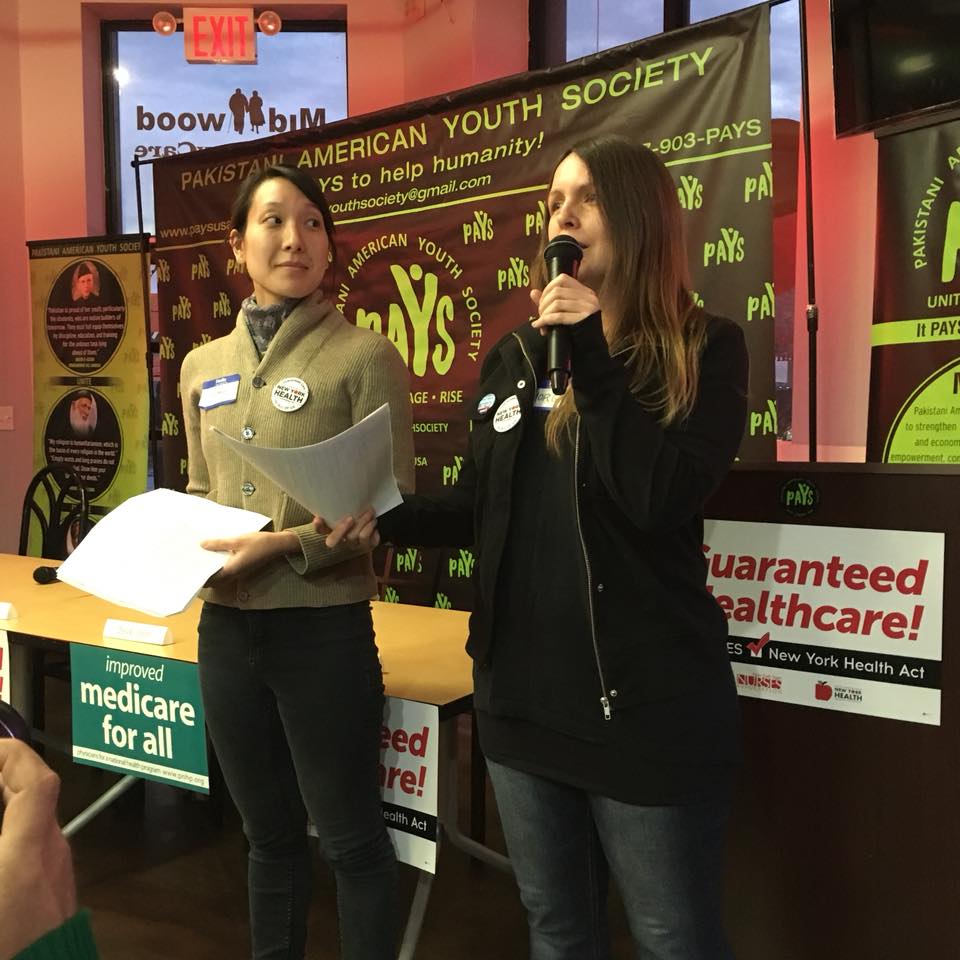
Literature about NYHA was available in English, Spanish, Russian, Chinese, Yiddish and Arabic. For future events, there are plans to also translate it into Haitian Kreyol, Urdu and Bengali.
“So, what is standing between us and making this happen?” Dr. Ray asked during the Q&A.
The panelists agreed that momentum is on the New York Health Act’s side. It has passed the State Assembly by wide margins four times – in 1992, 2015, 2016 and 2017. County legislatures are on board. Mayor Bill De Blasio “support[s] it 100 percent.” Governor Cuomo called it “a very exciting possibility.”
Although the State Senate version of the bill is officially co-sponsored by 31 of 32 elected Democrats, it can’t seem to make it out of the Health committee. “There’s one senator who’s not on board,” Dr. Ray explained. “Simcha Felder.”
State Senator Felder is the only Democrat to not co-sponsor the bill. This does not come as a surprise, considering he has caucused with the Republicans since taking office in 2012.
It’s poignant then that this first Brooklyn forum was held in Felder’s district, Senate District 17. “It’s extremely important to get his constituents to tell him that you want him to support this legislation,” Ms. Moore explained to the crowd. “The only way we can move Senators is having them hear directly from people in their district.”
Organizers outlined several ways to get involved. There were postcards available to send State Senators, to signal support for the New York Health Act. Those assembled were also encouraged to set up meetings with their elected officials, either at the representative’s office in Brooklyn, or in the state capitol at Campaign for New York Health’s lobby day in May.
“We’ll be organizing buses from New York City to take people up to Albany,” said Ms. Moore, “where you can engage your Senator or a member of their staff and encourage them to be on the right side of history.”
Adem Bunkeddeko, who is challenging Representative Yvette Clarke in the 9th Congressional district in June’s primary, called the forum “an inspiring moment.” “I support the New York Health Act as a means of delivering low-cost, high-quality and universal healthcare to Brooklyn. I was glad to be there to support the legislation.”




